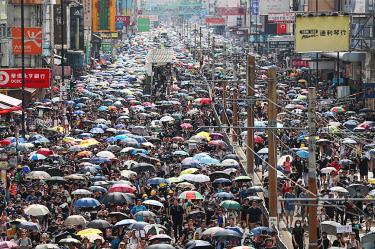Hong Kong police yesterday fired tear gas at protesters holding a banned rally against suspected triad gangs who beat up pro-democracy demonstrators near the Chinese border on Sunday last week.
Riot police fired dozens of rounds of tear gas in Yuen Long after tense standoffs with protesters, some of whom were throwing projectiles and had surrounded a police van.
Public anger has been raging since Sunday, when a gang of men in white T-shirts, armed with poles and batons, set upon protesters and bystanders in Yuen Long Station.
Police have been heavily criticized for being too slow to respond to Sunday’s violence, fueling accusations of collusion or turning a blind eye — allegations the force has denied.
Yesterday’s violence compounds the political crisis with the territory’s pro-Beijing leadership seemingly unable — or unwilling — to end the chaos.
Yuen Long is in Hong Kong’s New Territories, a rural area where many of the surrounding villages are known for triad connections and their staunch support for the pro-Beijing establishment.
Police say they have arrested 12 people so far in connection with Sunday’s violence, nine of whom have known triad links.
The white shirt mob ran into two villages near Yuen Long MTR Station after their attack and later left without police making any arrests, despite a large presence of officers.
These two villages became the focus of protester anger yesterday.
The rally began peacefully, but small groups, many in helmets and carrying shields, confronted police outside the villages and accused them of protecting triads.
Tensions soon escalated with projectiles hurled and a police van containing officers surrounded and daubed in graffiti.
Soon tear gas rounds were arcing through the air and a now-familiar pattern of running battles between police and protesters began.
Throughout the afternoon protesters formed shield walls of umbrellas, scattering each time new volleys of tear gas came their way.
In a rare move, police banned the rally, saying that they feared reprisal attacks against villagers from protesters, a decision that only heightened anger toward a force already perceived to be protecting pro-government aggressors.
Social messaging channels used to organize the largely leaderless movement quickly filled up with calls for people to have a “shopping spree” in Yuen Long or play Pokemon Go there.
Crowds spilled out of Yuen Long’s main station in the afternoon as the illegal march began peacefully. Many shops were shuttered.
“Every one of us came here on our own initiation,” a 25-year-old medical worker surnamed Ng said. “So I don’t think this is an illegal assembly. I’ve just come here as an individual to tell people my thoughts.”
Weeks of protests with huge turnouts have had little luck persuading Beijing or Hong Kong’s leaders. Beijing has issued increasingly shrill condemnations, but has left it to the territory’s government to deal with the situation.
Hong Kong Chief Executive Carrie Lam (林鄭月娥) has shown no sign of backing down beyond agreeing to suspend the extradition bill.
Protesters also plan to march today through a district where riot police fired tear gas and rubber bullets at projectile-hurling protesters the week before.
Police have allowed a rally to take place, but denied protesters permission to march, raising the likelihood of further confrontations.
Source: Taipei Times -2019/07/28





















